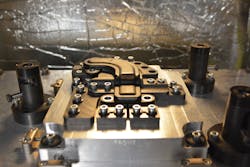Viking Plastics prepares for potential UAW strike

By Karen Hanna
A potential strike — which the United Auto Workers could declare Sept. 15 — could have knock-on effects across the automotive industry, but according to at least one supplier, the threat of a shutdown has, for now, brought additional work. Ahead of possible shutdowns, automakers are banking up inventories of parts, said Kelly Goodsel, CEO and president of Viking Plastics.
“I'm sure there are some bank builds going on or some pre-emptive planning by the auto companies to get some extra vehicles made or extra components on site, so if they do run into a slowdown situation, they've got that material on hand,” he said. “We're probably a little busier now than we would be if it wasn't a contract year.”
The effects of a strike are hard to predict. Even if it happens, Goodsel said it could take weeks to fully assess which vehicles, platforms and plants have taken on the biggest impacts.
It comes down to knowing what the union does if it and automakers can’t agree to new terms by the time the current contract expires Sept. 14. Goodsel said processors are subject to decisions outside their control: If the UAW opts to strike, which automakers would a walkout affect? Which lines? Which plants? What vehicle platforms?
“It may not have a direct impact on us,” he said. “The real fear, I think, in the industry is that the UAW targets two or three component plants, a chassis plant, an engine plant … that not only shuts down a GM assembly plant [for example], but maybe ripples through the market and shuts down other plants, as well.”
Based in Corry, Pa., the company juggles a part portfolio balanced about equally between customers in and outside the auto industry.
On the Friday before the UAW’s contract expires, Goodsel said his company was carrying on business as usual — with some minor tweaks. The following day, he said, plants might have had weekend operations, but, with the auto industry holding its breath, the company was playing it safe.
“Under normal circumstances, we might have worked one day this weekend, or two days this weekend,” Goodsel said. “And we said, ‘You know what, let's not work this weekend, because in two weeks, if the plant is slower because of strike, we'll be able to catch up.”
With three plants in the U.S. and four plants spread between China and Brazil, Viking Plastics employs just under 200 people. In addition to making parts for vehicles tied to Detroit’s Big Three automakers, as well as other companies, it churns out parts for appliances, such as air conditioners.
In recent months, Viking Plastics has experienced an uptick in work related to the auto industry — a phenomenon Goodsel attributes mostly to the catch-up work the industry has taken on in its long recovery from the COVID-19 doldrums, when auto manufacturing cratered.
Having worked at Viking Plastics for 23 years, Goodsel said he knows it’s now better positioned to absorb impact from another potential disruption to the auto industry.
“We've got other business and other customers that we need to continue to support,” he said.
Its strategy of diversification helped Viking Plastics carry on as auto production slowed in the COVID years (read more in our On the Factory Floor feature), and Goodsel said, it provides some advantages as strike talks heat up.
“Unlike some in the industry, we're in very good financial shape. ... There are some suppliers out there that if the strike were to last 30 days, they are not financially strong enough to survive that.”
But, Goodsel said, “With every bad thing comes an opportunity, and we’ve got to be ready to take advantage of that opportunity.”
About the Author
Karen Hanna
Senior Staff Reporter
Senior Staff Reporter Karen Hanna covers injection molding, molds and tooling, processors, workforce and other topics, and writes features including In Other Words and Problem Solved for Plastics Machinery & Manufacturing, Plastics Recycling and The Journal of Blow Molding. She has more than 15 years of experience in daily and magazine journalism.